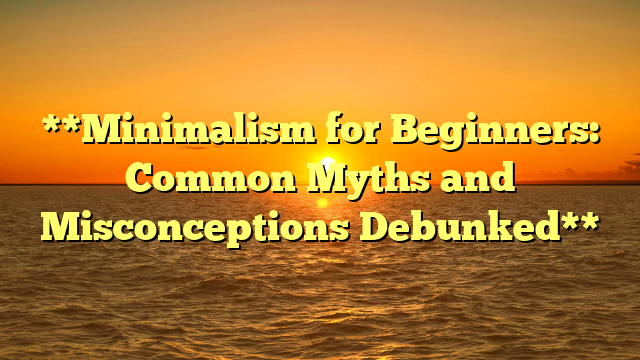
Minimalism has become a popular lifestyle trend, but with its rise in popularity comes a variety of myths and misconceptions. For beginners, it can be overwhelming to know where to start or how to approach this way of living. Understanding what minimalism truly entails can help clear up confusion and make the transition smoother. In this article, we will debunk some of the most common myths about minimalism and provide a clearer perspective for those interested in embracing this lifestyle.
**Myth 1: Minimalism Means Living with Absolutely Nothing**
One of the biggest misconceptions about minimalism is that it involves living in an empty, stark environment with almost no possessions. Many people assume that minimalists get rid of everything and live in bare, utilitarian spaces.
**Debunked**:
Minimalism isn’t about depriving yourself of things; it’s about being intentional with what you own. The goal is to remove excess and focus on possessions that truly add value to your life. Minimalism encourages quality over quantity, so a minimalist home can still be cozy, functional, and filled with items you genuinely love and need.
**Myth 2: Minimalism Is Only About Decluttering**
Another common misconception is that minimalism is simply about decluttering your physical space. While decluttering is certainly angsa4d of it, minimalism is much more than that. It involves simplifying all areas of your life, including your mental, emotional, and digital space.
**Debunked**:
Minimalism goes beyond physical possessions. It’s a mindset shift that encourages you to prioritize what truly matters, which can extend to relationships, work, and even time management. For example, minimalism might mean setting boundaries in your professional life, focusing on meaningful relationships, or reducing distractions in your daily routine.
**Myth 3: Minimalists Are Miserable and Don’t Enjoy Life**
Some people believe that minimalism is synonymous with living a joyless or restrictive life, where you have to give up things you love in order to embrace simplicity. This could not be further from the truth.
**Debunked**:
In reality, minimalism can lead to greater freedom and happiness. By removing distractions and unnecessary possessions, minimalists often find more time, energy, and resources to focus on what brings them true joy, such as hobbies, travel, or spending time with loved ones. Minimalism isn’t about depriving yourself; it’s about making room for the things that truly enhance your life.
**Myth 4: You Have to Be Perfect at Minimalism**
Many beginners worry that they have to get minimalism “perfect” in order to live a minimalist lifestyle. The idea of doing everything right or having a perfectly curated space can be intimidating.
**Debunked**:
Minimalism is not about perfection. It’s a journey, not a destination. There’s no single way to be a minimalist, and everyone’s approach will look different. The key is to make intentional choices about what adds value to your life and let go of what doesn’t. Minimalism is about progress, not perfection, so don’t be discouraged by small setbacks or the process of letting go of items slowly.
**Myth 5: Minimalism Is Only for Young, Single People**
Some people think minimalism is a lifestyle suited only for young, single individuals who don’t have many responsibilities. This stereotype can make it feel like minimalism isn’t accessible to families, people with pets, or those with busy, full lives.
**Debunked**:
Minimalism can be practiced by anyone, regardless of age, relationship status, or family size. In fact, many families embrace minimalism to create a simpler, more organized living environment and to focus on experiences over material possessions. Minimalism can be adapted to suit various lifestyles and can benefit people in all stages of life.
**Myth 6: You Have to Buy Expensive, “Minimalist” Items**
Some beginners believe that in order to be a true minimalist, you need to purchase expensive, high-end items that fit a “minimalist” aesthetic. This can make minimalism seem financially out of reach for many people.
**Debunked**:
Minimalism is not about buying expensive items; it’s about being intentional with what you own. It’s possible to adopt a minimalist lifestyle by making do with what you already have or by buying secondhand, upcycled, or affordable items that fit your needs. The focus is on reducing excess, not on purchasing luxury items to fit a trend.
As with any lifestyle change, minimalism comes with its fair share of myths and misconceptions. By debunking these common misunderstandings, beginners can gain a clearer understanding of what minimalism truly is. At its core, minimalism is about simplifying your life, letting go of excess, and focusing on what truly adds value. It’s a personal journey that can be adapted to fit your unique lifestyle, priorities, and goals.





